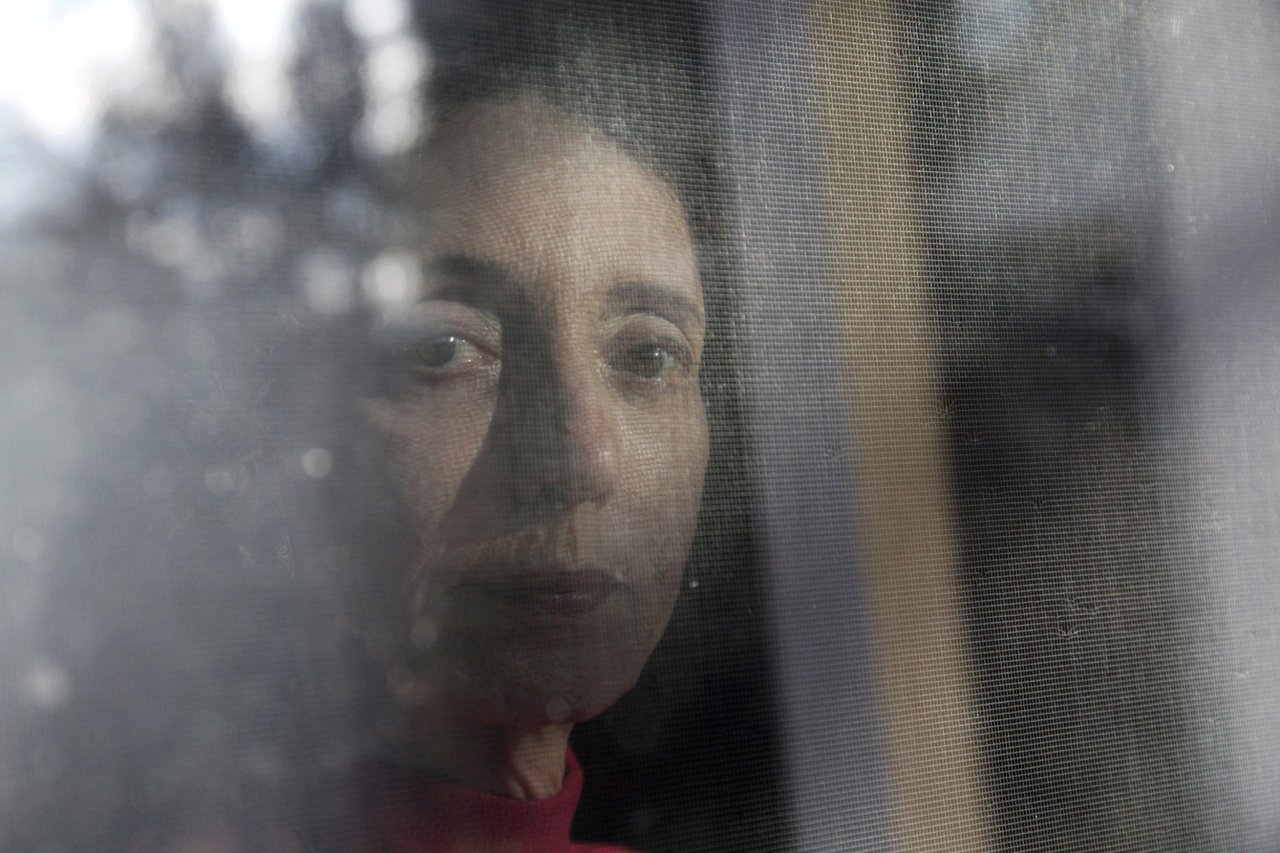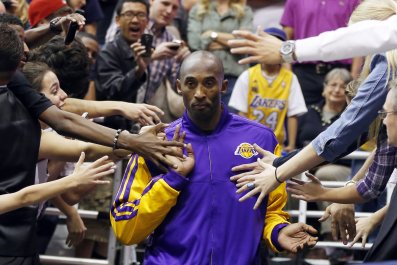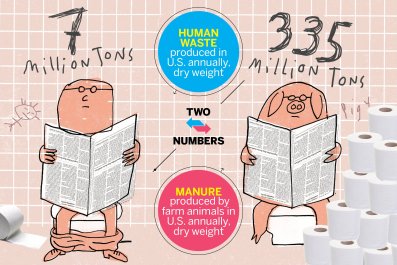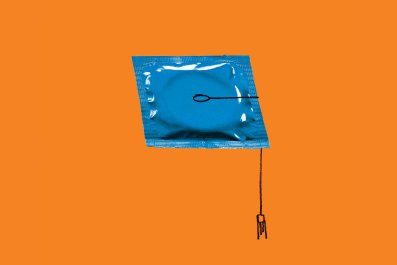In bookstores, Joyce Carol Oates is a staple—an author of more than 40 books of fiction, whose awards and decorations are numerous.
But on Twitter—where Oates communicates daily with her more than 130,000 followers—the 77-year-old author is another force entirely. Her 140-character musings, on everything from racism and global conflict to kale, have become a surreal object of fascination on the medium. Oates's tweets regularly draw dozens of replies and blog posts, and her Twitter has been described as "infamous" and as "the #1 self-parody account on Twitter." It's a burgeoning industry for bloggers—Salon.com has a dedicated beat chronicling Oates's tweets. The author's social media presence is such a palace of wonder that some replies to her tweets have become as iconic as the tweets themselves.
.@JoyceCarolOates thats not the same at all thats terrible youre terrible but thank you for inventing oatmeal
— DVS (@DVSblast) February 8, 2014
More recently, the National Book Award winner drew negative attention with a series of tweets wondering whether there exists anything "celebratory & joyous" about ISIS.
All we hear of ISIS is puritanical & punitive; is there nothing celebratory & joyous? Or is query naive?
— Joyce Carol Oates (@JoyceCarolOates) November 22, 2015
Portrayal of non-combative life under ISIS so grim & narrow, why would anyone wish to live in such a way? Mass delusion?
— Joyce Carol Oates (@JoyceCarolOates) November 23, 2015
Oates spoke with us from her home in New Jersey about Twitter, Internet comments and whether or not a hot dog is a sandwich. This interview has been lightly condensed.
How did you first get involved with Twitter?
I was given an account by my publisher, at HarperCollins. I would not have initiated it myself. In fact, I would never have even thought about it. I think the idea is that when writers go out on the road or give readings at universities, we're expected to post where we're going to be. There are some writers, like Margaret Atwood, obviously, [for whom] it becomes more involved. Margaret tweets a number of times a day. She's very involved with politics and endangered species of birds and so forth.
I retweet, and I have tweets of my own. But usually my tweets are responses to other things I've seen on Twitter. What I tweet gets retweeted or taken out of context, so it doesn't seem to be part of a dialogue.
Do you think any of your recent tweets have been taken out of context?
Well, I think so. I was responding to the idea of Thanksgiving, the upcoming holiday season and what I assume is a real emotional impoverishment in other parts of the world where there are totalitarian dictatorships and states that are very hostile to human happiness and joy. I used the word joyous. That people live without joy seems very tragic to me. So I was talking about the emotional impoverishment of ISIS, wondering why anyone would choose to live in that way. But I had a number of tweets—probably 20 or more on the subject. Just the others don't get retweeted.
If we could return from the dead how mesmerized we would be by rippling of wind through trees, grasses, flowers...just stare & stare happily
— Joyce Carol Oates (@JoyceCarolOates) July 18, 2015
Why do you think that tweet got so much attention?
I think it's the nature of Twitter and social media. People are looking for something to take out of context and then they magnify it. Even though it's the opposite meaning of the original meaning. [It's] just part of the whirligig or chaos or fleeting sensationalism of social media, that things are exaggerated and then forgotten, and then the next thing comes along, and it's exaggerated and forgotten.
Did you read the replies to that particular tweet?
Well, some of them. It seemed like there was a reversal of my meaning. But I couldn't really explain that except by other tweets. There's no way to explain to that to those particular people.
Okay, who got grandma stoned? https://t.co/j010QF9NXe
— Molly Ringwald (@MollyRingwald) November 24, 2015
For example, Molly Ringwald, the actress, tweeted: "OK, who got grandma stoned?"
Who got what?
"Who got grandma stoned?"
I don't know what was so unusual about what I suggested, that there's an emotional impoverishment. I don't understand why it would be considered that a person who said that was hallucinating.
What sort of people do you like to follow on Twitter?
Well, I follow Daniel Mendelsohn, the classicist. I follow Steven Pinker. Steve Martin. Bill Maher.
Do you have a favorite?
No. I'm trying to remember who else I follow. I follow the poet Henri Cole. Oh, ACLU. Michael Moore.
Do you draft and revise your tweets, or do you just tweet whatever comes to mind right away?
No, I revise them.
Still can't comprehend why the Danish zoo killed the beautiful young healthy giraffe. Yes, they had "reasons"--so did Nazi doctors.
— Joyce Carol Oates (@JoyceCarolOates) February 11, 2014
Do you think Twitter can be conducive to thoughtful conversation?
I don't know how to answer that. Basically, when I look at Twitter, I often click on the articles that somebody is linking. Steven Pinker has interesting science articles. And Michael Shermer, another scientist or intellectual. A lot of what I do is clicking onto articles, in the Guardian, substantial articles in The Atlantic, mostly, or Canadian publications. It's like a magazine or newspaper.
Do you ever read the articles that are published about your tweets?
I've seen some of them. But they really seem so hostile. I write all sorts of tweets about many, many things. I write tweets all the time! But people don't seem to know that.
Do you ever leave comments on articles? Internet comments?
Have you actually looked at my tweets?
Yes, I have.
Well, you don't seem to be aware of them. I often retweet. I often have comments.
I mean, do you write in the comments section of articles? On websites where there's a comments section?
No, probably not. I probably only see like 1 or 2 percent of anything, of responses. Unless they're from people whom I know.
Considering boycotting kale, gluten-free cereal, & Gatorade until social injustice is righted.
— Joyce Carol Oates (@JoyceCarolOates) May 9, 2014
Do you prefer to call them "favorites" or "likes"?
I don't have any strong feeling. I never used it.
Do you find that most of your friends use Twitter as well?
Almost nobody. No, almost nobody.
Have you ever really regretted a tweet?
I'm not sure. Hmm. When I first started a long time ago, a couple years ago, I was involved with gun rights advocacy, gun control and so forth. I got many, many hostile tweets in the very beginning—which I actually read. And they were extremely hostile. But then as time went on, I stopped reading those hostile tweets. Or I blocked them. If you take a position on gun control, you draw a lot of very angry people. It's not that I regret those. But I would probably do it a bit differently [than] when I started out.
So barbaric that this should still be allowed... No conservation laws in effect wherever this is? https://t.co/hgavm9IBaM
— Joyce Carol Oates (@JoyceCarolOates) June 9, 2015
Your Twitter drew a lot of attention about five months ago when you tweeted a picture of Steven Spielberg on the set of Jurassic Park.
Oh, that was meant to be a joke! I have many, many tweets that are meant to be funny. I have tweets from even today [that are] meant to be funny. They're not supposed to be taken literally.
People misunderstood that tweet.
Well, it was just meant to be funny. I had a fake dinosaur picture on Twitter some months before. It was something that I'd taken at the Natural History Museum. A flying dinosaur. I said [it] was the New Jersey State Bird. Now that was obviously a joke. But some people thought it was a real bird. They wrote to me and said they'd never seen a bird like that in New Jersey. What can I do? I can't really explain a joke as I'm making a joke. I just thought it was funny that some people thought that a flying dinosaur bird was a New Jersey bird. I didn't really regret it.
The president recently made a personal Twitter account for himself. Do you have any Twitter advice for President Barack Obama?
I follow him. His tweets are obviously crafted. They're not going to offend anybody. He can't be witty, like Bill Maher. Steve Martin is a wonderful tweeter, but he's drawn back from it because a lot of his were misunderstood.
"Cat food" in China actually is.
— Joyce Carol Oates (@JoyceCarolOates) May 13, 2014
There was a debate that broke out on Twitter about whether or not a hot dog is a sandwich. Did you follow that debate?
No.
Do you have an opinion on it?
No.
No opinion?
No. But that seems typical of the trivial nature of Twitter. Who cares? We have this law enforcement crisis in the United States where black people are being shot down in the streets, and that's a real social evil. That's what people should be concerned about. Most of what I follow on Twitter has to do with social injustice. I could care less about a hot dog.





















